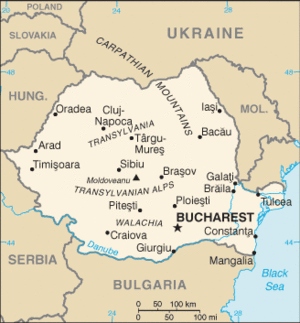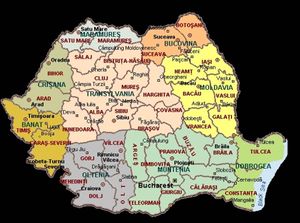Difference between revisions of "Romania"
Maplefanta (talk | contribs) |
m |
||
| Line 8: | Line 8: | ||
}} | }} | ||
[[Image:ro-map.gif|thumb|right|300px|Map of Romania]] | [[Image:ro-map.gif|thumb|right|300px|Map of Romania]] | ||
| − | In '''Romania''' payment for the ride is often expected, although foreigners often aren't asked for anything. The local currency is the Leu (exchange rate: 1 Euro = aprox. 3.5 Lei). | + | In '''Romania''' payment for the ride is often expected, although foreigners often aren't asked for anything. It is still cheaper than trains and buses though. The local currency is the Leu (exchange rate: 1 Euro = aprox. 3.5 Lei). When hitchhiking, it's best to hold a sign with the name of the place you want to go. People expect to be payed for giving a ride, but if you tell them in advance that you are unable to pay, 4 out of 5 will take you anyway.<br /> |
| − | Getting a ride can sometimes be difficult, as some of the cars that pass seem tiny, ancient and packed with more people than there are seats. This is probably due to the low rate of car ownership in some areas, and the fact that hitching is still a common way for locals to travel, particularly in the country. | + | Getting a ride can sometimes be difficult, as some of the cars that pass seem tiny, ancient and packed with more people than there are seats. This is probably due to the low rate of car ownership in some areas, and the fact that hitching is still a common way for locals to travel, particularly in the country.<br> |
| + | Romania has a long established hitchhiking tradition from the communist era. Back then, few people had cars, and there was a constant fuel shortage, so sharing a ride was the best way to get from A to B. | ||
== Language == | == Language == | ||
| Line 16: | Line 17: | ||
* [[Romanian phrasebook]] | * [[Romanian phrasebook]] | ||
| − | == Cities in Romania == | + | == Cities in Romania (by size) == |
* [[Bucharest]] | * [[Bucharest]] | ||
* [[Cluj-Napoca]] | * [[Cluj-Napoca]] | ||
* [[Constanta]] | * [[Constanta]] | ||
| + | * [[Oradea]] | ||
| + | * [[Sibiu]] | ||
* [[Baia Mare]] | * [[Baia Mare]] | ||
| − | + | ||
| + | |||
== Number plates == | == Number plates == | ||
| Line 33: | Line 37: | ||
* diplomatic: TC-xxxxxx, CD-xxxxxx (blue writing on white background, blue strip on the left, with the country code "RO" and the Romanian or EU flag) | * diplomatic: TC-xxxxxx, CD-xxxxxx (blue writing on white background, blue strip on the left, with the country code "RO" and the Romanian or EU flag) | ||
* Ministry of Internal Affairs: MAI-xxxxxx (blue writing on white background, blue strip on the left, with the country code "RO" and the Romanian or EU flag) | * Ministry of Internal Affairs: MAI-xxxxxx (blue writing on white background, blue strip on the left, with the country code "RO" and the Romanian or EU flag) | ||
| − | * Romanian Army: A-xxxxxx (black writing on white background, no other markings on the plates) | + | * Romanian Army: A-xxxxxx (non-reflective, black writing on white background, no other markings on the plates) |
* some cities have special, internal, or local license plate numbers, usually used for machinery (excavators, rollers, public transport ...) | * some cities have special, internal, or local license plate numbers, usually used for machinery (excavators, rollers, public transport ...) | ||
Where x is a random number. | Where x is a random number. | ||
Revision as of 08:40, 6 March 2008
| Information | |
| Language: | Romanian |
| Capital: | Bucharest |
| Population: | 22,276,056 |
| Currency: | Leu ( RON ) |
| Hitchability: | |
| Meet fellow hitchhikers on Trustroots | |
In Romania payment for the ride is often expected, although foreigners often aren't asked for anything. It is still cheaper than trains and buses though. The local currency is the Leu (exchange rate: 1 Euro = aprox. 3.5 Lei). When hitchhiking, it's best to hold a sign with the name of the place you want to go. People expect to be payed for giving a ride, but if you tell them in advance that you are unable to pay, 4 out of 5 will take you anyway.
Getting a ride can sometimes be difficult, as some of the cars that pass seem tiny, ancient and packed with more people than there are seats. This is probably due to the low rate of car ownership in some areas, and the fact that hitching is still a common way for locals to travel, particularly in the country.
Romania has a long established hitchhiking tradition from the communist era. Back then, few people had cars, and there was a constant fuel shortage, so sharing a ride was the best way to get from A to B.
Language
Romanian is one of the few non-Slavic East-European languages. It is related with French, Italian, Spanish etc. Speakers of one of these languages will find it easier to pronounce and understand Romanian.
Cities in Romania (by size)
Number plates
Romanian license plate numbers usually have two formats:
- Regular number plates: XX-yy-ZZZ (black writing on white background, blue strip on the left, with the country code "RO" and the Romanian or EU flag)
- Temporary leasing number plates: XX-yyyyyy (red writing on white background, blue strip on the left, with the country code "RO" and the Romanian or EU flag)
Where XX is the two letter code of the county (see below), y is a random number, and Z a random letter.
There are also special number plates:
- diplomatic: TC-xxxxxx, CD-xxxxxx (blue writing on white background, blue strip on the left, with the country code "RO" and the Romanian or EU flag)
- Ministry of Internal Affairs: MAI-xxxxxx (blue writing on white background, blue strip on the left, with the country code "RO" and the Romanian or EU flag)
- Romanian Army: A-xxxxxx (non-reflective, black writing on white background, no other markings on the plates)
- some cities have special, internal, or local license plate numbers, usually used for machinery (excavators, rollers, public transport ...)
Where x is a random number.
County license plate codes
| County | Code | Residence | County | Code | Residence | County | Code | Residence | County | Code | Residence |
| Alba | AB | Alba Iulia | Buzau | BZ | Buzau | Gorj | GJ | Targu Jiu | Prahova | PH | Ploiesti |
| Arad | AR | Arad | Caras-Severin | CS | Resita | Harghita | HR | Miercurea Ciuc | Satu-Mare | SM | Satu-Mare |
| Arges | AG | Pitesti | Cluj | CJ | Cluj-Napoca | Hunedoara | HD | Deva | Salaj | SJ | Zalau |
| Bacau | BC | Bacau | Calarasi | CL | Calarasi | Ialomita | IL | Slobozia | Sibiu | SB | Sibiu |
| Bihor | BH | Oradea | Constanta | CT | Constanta | Ilfov | IF | Bucharest | Teleorman | TR | Alexandria |
| Bistrita-Nasaud | BN | Bistrita | Covasna | CV | Sfantu Gheorghe | Maramures | MM | Baia Mare | Timis | TM | Timisoara |
| Botosani | BT | Botosani | Dambovita | DB | Targoviste | Mehedinti | MH | Drobeta Turnu-Severin | Tulcea | TL | Tulcea |
| Brasov | BV | Brasov | Dolj | DJ | Craiova | Mures | MS | Targu Mures | Valcea | VL | Ramnicu Valcea |
| Braila | BR | Braila | Galati | GL | Galati | Neamt | NT | Piatra Neamt | Vaslui | VS | Vaslui |
| Bucharest | B | – | Giurgiu | GR | Giurgiu | Olt | OT | Slatina | Vrancea | VN | Focsani |

